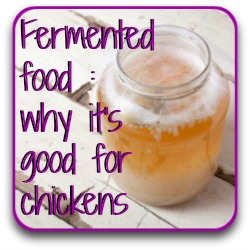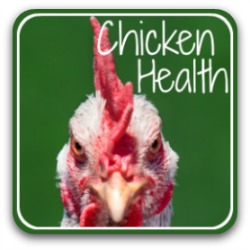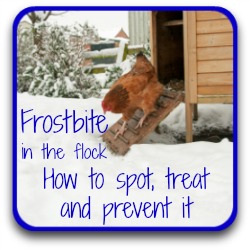Apple cider vinegar for chickens: proven benefits and risks.
You’ve probably read about apple cider vinegar (ACV) on chicken-keepers’ blogs. Some swear it cures everything from smelly poop to serious illness.
Others dismiss it as nothing more than an untested folk remedy. In some places it’s even banned from being spoken about, let alone promoted as a cure.
So what’s the truth?
In this article, I look at the scientific evidence for and against ACV, and share how to give it safely, plus the right amount to use in your flock’s water.
Having considered all the facts, you will then be able to make a properly informed decision about whether or not to use it in your own flock.
🪶 Featherlight Takeaways.
Quick insights from this article – especially helpful if you want to know exactly when and how apple cider vinegar can help your flock.
- Only raw, unpasteurised ACV with the "mother" contains the good bacteria.
- Proven benefits: supports gut health, boosts immunity, and may help prevent coccidiosis.
- Not a cure for worms, mites, lice, or respiratory problems.
- Stick to 2% in drinking water for adults, 0.5% for chicks.
- Never use ACV in metal waterers – only use plastic or, better still, stoneware.
What is Apple Cider Vinegar, and why give it to chickens?
Apple Cider Vinegar (ACV) is simply fermented apple juice.
People have used it for thousands of years in cooking and for its supposed health benefits, from aiding digestion to supporting weight loss.
For chickens, interest in ACV grew as researchers searched for natural alternatives to antibiotics, the over-use of which has caused antibiotic resistant bacteria to become part of everyday life.
So in Europe, antibiotic use in livestock rearing has been banned since 2006.
Other ways to combat illness and in particular bacterial diseases had to be found: that led to research for natural alternatives, including studies on ACV as a safe, low-cost way to support poultry health.
It's those studies that this article is based on.
Links on the rest of this page are "affiliate links". If you click on them and buy, I earn a small commission at no cost to you. I only recommend products I know and love and which I think will be genuinely useful to you. See my disclosure policy for more information.
Important: type matters! Always choose apple cider vinegar with "the mother".
Not all apple cider vinegar is the same. The clear bottles you’ll see in supermarkets are usually pasteurised. That process kills off the beneficial bacteria, so they don’t offer the same health boost.
What you need is raw, organic, unpasteurised ACV – the cloudy kind that contains "the mother". This is the stringy, cobweb-like substance that forms during fermentation. It’s packed with probiotics, vitamins and minerals, and it’s where the real benefits lie.
How to tell the difference:
- Pasteurised ACV: clear, filtered, most of the goodness has been filtered out.
- Unpasteurised ACV: cloudy, with strands of "mother" floating inside.
Some chicken keepers make their own ACV, where the "mother" can be even thicker and more visible. It may look odd, but that’s the good stuff.
 This slimy mess is "the mother" - found only in unpasteurized ACV.
This slimy mess is "the mother" - found only in unpasteurized ACV.Pro Tip: A well-known brand is Bragg’s Organic Apple Cider Vinegar. It’s raw, unpasteurised and contains the mother, which is exactly what you want for your flock.
Find it in your local supermarket, or buy online if it's not stocked.
Apple cider vinegar: common claims vs reality.
If you’ve browsed forums and chicken-keeping blogs, you’ve probably seen apple cider vinegar promoted as a cure-all. Claims include everything from stopping mites to clearing respiratory disease.
The truth? Most of these claims are anecdotes, not evidence. A few examples:
- "It cures mites and lice". Not true. Parasites aren’t "put off by the taste"!
- "It clears the airways". The studies people quote actually don't talk about the respiratory system but refer to the gut lining ("mucosa").
- "It makes the gut a nasty place for worms to live" – i.e. "it’s a natural wormer". There's no scientific proof at all for this.
- That doesn’t mean ACV is useless – far from it. But expecting it to solve every health problem is risky. Serious issues like parasites or respiratory infections need proper treatment, not vinegar.
The good news: there are proven benefits, backed by research. Let’s look at those next.
 Lulu, one of my Red Stars, likes hanging out in her apple tree!
Lulu, one of my Red Stars, likes hanging out in her apple tree!Proven health benefits of apple cider vinegar for chickens.
1. Helps prevent coccidiosis.
Coccidiosis is a common disease in chickens, and drug resistance to the bacteria that cause it is a growing problem.
Studies show that chickens given ACV in drinking water had increased the beneficial anti-oxidants and decreased the number of harmful toxic stressors.
Chickens given ACV in their drinking water showed no clinical signs of coccidiosis, while two untreated groups did(1, 2).
2. Fights harmful bacteria and supports the immune system.
In studies including both adults(3) and baby chicks(4), ACV has been shown to reduce dangerous bacteria such as salmonella, campylobacter and e-coli.
At the same time, it boosts the immune system, making chickens more resilient to disease.
3. Improves digestion and nutrient absorption.
By clearing harmful bacteria from the gut, ACV allows nutrients to be absorbed more effectively(3, 4).
The gut itself then has room to improve. The structure and surface area of the gut lining increases, the "intestinal mucosa" becomes less inflamed, and the chicken can absorb more nutrients as a result.
So your flock gets more from their feed.
 Making your own ACV is possible but can go wrong.
Making your own ACV is possible but can go wrong.A note on calcium absorption.
You may read online that ACV stops hens absorbing calcium – or, in other places, that it helps them absorb more. Confusingly, some articles even say both!
The latest research(6) shows that ACV improves the gut’s ability to absorb nutrients, including calcium.
The key is dosage: problems only arise if ACV is overused. Stick to the recommended amounts and always provide a good calcium source (like oyster shell), and you won’t affect your hens’ shell quality.
4. May support growth.
Because ACV decreases bacteria and helps nutrient absorption, chickens given ACV were demonstrated to show improved growth(3, 4).
This matters most in commercial flocks, but backyard chickens can still benefit from reaching their full potential.
5. Can give egg production a small boost.
One study(5) found hens given ACV laid more eggs at their peak laying age (around 24–28 weeks).
The effect was short-lived, but it’s perhaps an encouraging bonus for hens of that age.
Is there evidence against using apple cider vinegar for chickens?
Yes, there's some. But it's mostly when ACV is misused that problems arise.
Although older studies(7) found little benefit, more recent research shows otherwise. And although some blogs dismiss ACV entirely, others exaggerate it as a cure-all.
In both cases (research and chicken-keepers' experiences), the truth lies somewhere in between.
What matters is how and when you use it:
- Don’t combine it with antibiotics or certain medications – the acidity may reduce their effectiveness(3).
- Never use metal drinkers. Vinegar corrodes metal and can contaminate the water.
- Avoid overuse: too much acidity may interfere with nutrient absorption, especially calcium.
Apple cider vinegar isn’t a miracle cure, but used wisely it can be a useful ally in keeping your flock healthy.
How much, and how to feed ACV for chickens.
You can make your own ACV with the mother, but it’s easier (and safer) to buy a reliable brand.
I use Braggs, which is organic, unpasteurised, and 5% acetic acid which is exactly the concentration used in most research studies.
How much apple cider vinegar is enough?
These levels are those found to be the most effective in the research studies.
- Adult chickens: 20ml per litre of water (about 5 tablespoons per US gallon).
- Baby chicks: 5ml per litre of water (about 1 teaspoon per litre, or 4 teaspoons per US gallon).
- Add to water for no longer than one week per month.
- Never use metal drinkers – the acidity corrodes them.
- Don’t add to feed: damp food grows bacteria quickly.
Conclusion.
 Raw, organic, unpasteurised apple cider vinegar.
Raw, organic, unpasteurised apple cider vinegar.Apple cider vinegar with the mother is not a miracle cure. However, research shows it can support gut health, immunity and even egg laying when used carefully.
The key, as with all things, is moderation: offer it in water occasionally, never in metal waterers, and don’t expect it to solve problems it can’t.
Used wisely, ACV can be a useful natural supplement in your chicken-keeping toolkit.

Frequently Asked Questions.
Does apple cider vinegar prevent worms or mites in chickens?
Does apple cider vinegar prevent worms or mites in chickens?
No. There’s no evidence ACV has any impact on mites, lice, or worms. They will need proper treatment.
Can apple cider vinegar replace antibiotics?
Can apple cider vinegar replace antibiotics?
Not entirely. But research shows it may help reduce harmful bacteria like salmonella and coccidiosis, so it can play a role in prevention and overall gut health.
Is apple cider vinegar safe for laying hens?
Is apple cider vinegar safe for laying hens?
Yes, provided it's used at the correct dosage. Overuse can affect calcium absorption, so always provide extra calcium and stick to recommended amounts.
How much apple cider vinegar should I give my chickens?
How much apple cider vinegar should I give my chickens?
The optimum amount suggested by research is around 20ml per litre of water (5 tablespoons per US gallon) for adults, and 5ml per litre (1 teaspoon) for chicks.
Offer it for no longer than one week each month, and never in metal drinkers. Plastic and stoneware are best.

More about fermentation.
Fermenting feed for chickens is an excellent way to boost their immune system, keep disease at bay and help them lay eggs with stronger shells.
These two articles describe (left) the benefits of fermentation for chickens; and (right) step-by-step how make fermented chicken feed.

Other articles about healthy food for chickens.

Sources and further reading.
A lot of "facts" you'll find on the internet are often people's individual views, based on inaccurate information repeated from poor quality sources.
The information I provide in this article and others is based not just on my own experience, but on evidenced facts from scientific, peer-reviewed research and highly respected and experienced poultry keepers such as Gail Damerow.
Some of the sources I have used in this article are these. They're by no means the only ones - you'll find many others by doing a simple search.
1. Firas, F.M.F. Hayajneh et al: Anitcoccidial Effect of Apple Cider Vinegar on Broiler Chickens: an Organic Treatment. Pub. Polish Journal of Veterinary Sciences, 2018.
2. Quiroz-Castaneda, R.E. and Dantan-Gonzalez, E.: Control of avian coccidiosis: future and present natural alternatives. Pub. BioMed Research International, 2015.
3. Khan, S.H. et al: Recent advances in the role of organic acids in poultry nutrition. Pub. Italian Journal of Animal Science, 2015.
4. Allhardo, P. et al: Effect of probiotic and vinegar on growth performance, meat yields, immune responses and small intestine morphology of broiler chickens. Pub. Italian Journal of Animal Science, 2018.
5. Dhawale, A: Better eggshell quality with a gut acidifier. Pub. Poultry International, 2005.
6. Jahantigh, M, et al: Effects of dietary vinegar on performance, immune response and small intestine histomorphology in 1 - 28 day broiler chickens. Pub. Journal of Veterinary and Medical Science, 2021.
7. Kubena, L.F: Effects of Drinking Water Treatment on Susceptibility of Laying Hens to Salmonella Enteriditis During Forced Molt. Pub. Journal of Poultry Science, 2005.


















